18/10/2025 Magnezit Group wins the Industrial design award
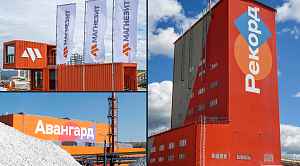
Magnezit Group wins the Industrial design award
18/10/2025
The National award «The Best Industrial Design of Russia» is held by the Ministry of Industry and Trade of the Russian Federation jointly with the Government of Moscow. The leaders of the country’s industry with their partners, design studios and bureaus, take part in it every year.
This year, Magnezit Group was recognized as the best among more than 500 contestants from 63 regions in its nomination «Design of industrial Spaces». The award reflected the Group’s innovative approach to modern industrial design and the visual culture of production organization, implemented in the project «Value Space: the Production Environment as a system of meanings.»
The project solves a set of tasks related to the creation of an industrial design code — a unique concept and standards for the design of the production environment, effective navigation and translation of corporate values. It is a visual embodiment of the technological progress of the Magnezit Group and transforms the industrial space into a space of meanings that determine the attitude of all who are in it to their work, results and interaction with each other.
More information about the project can be found on its platform on the Internet (available in Russian only).
29/05/2025 Magnezit Group is the winner of the project "More than an employer"
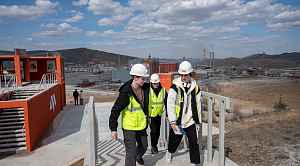
Magnezit Group is the winner of the project «More than an employer»
29/05/2025
Magnezit Group is the winner of the «More than an Employer-2025» project competition. Within its framework, students have the opportunity to complete internships and participate in career guidance tours at leading enterprises in the country, acquiring professional skills and getting acquainted with potential employers.
The project has been introduced in 2022 with the support of the federal organizations Rosmolodezh and the Center for Assistance to Young Professionals, as well as the Russian Ministry of Education and Science. Its reach encompasses 29 regions of the country and more than 120 enterprises.
For the Group, participation in this project means expanding opportunities to attract talented and promising college and university students not only from the region of the presence, but across the entire Russia.
Working with young people is one of the main priorities of the Group’s personnel policy, which is dictated by the realities of modern high—tech production. This implies the need to attract highly qualified employees to work at the innovative and highly automated production facilities built over the past decade as part of the modernization programme and to preserve the Group’s research potential as the flagship of the Russian refractory industry. Important elements of working with staff in this regard are the Group’s mentoring development program, in which experienced specialists in various departments participate in the training of new employees, and the scholarship program, which has been implemented for more than 50 years. Over the past period, about a thousand students of specialized universities and colleges have become its participants. Additionally, a new initiative of the company is being implemented — the ProfStart program.
19/03/2025: Sergei Korostelev elected to the Russian Union of Industrialists and Entrepreneurs Board
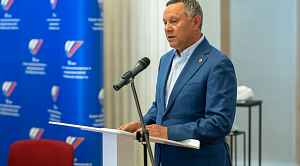
Sergey Korostelev elected to the Russian Union of Industrialists and Entrepreneurs Board
19/03/2025
Since March 2025, Magnezit Group is a member of the Russian Union of Industrialists and Entrepreneurs (RSPP), and at the XXXIV Congress of the Union held in Moscow on 18 March 2025, President of the Group Sergey Korostelev was elected as a member of its Board.
Magnezit group has long participated in the work of the Union of Industrialists and Entrepreneurs of the Chelyabinsk region. In cooperation with colleagues, the Group implemented many projects to expand the potential of the regional economy, as well as a wide range of environmental, social and cultural development initiatives and other sustainable development programs.
The decisions implemented in March will further facilitate the Group’s participation both in the activities of the Union and its regional bodies. In particular, the Group and its leader will participate in developing proposals on improving the interaction of the business community and authorities in the field of protection of national economic interests and domestic market, strengthening of Russia’s raw material and technological security. In addition, the extensive experience of Sergey Korostelev in organizing and promoting public-private partnership projects aimed at development of regions will be utilized at the federal level.
Within the framework of its sustainable development strategic goals, the Group has adopted a Social Investment Policy to create lasting processes of positive change in local communities. On the initiative and under the direct supervision of Sergey Korostelev, the town-forming company together with the regional authorities implemented various initiatives that are essential for the residents of the municipality, and the total social investment of the Group in the social and cultural sphere of the region over the last 20 years has reached 13 billion.
17/02/2025: Magnezit Group is included in Expert RA ESG-ranking

Magnezit Group is included in Expert RA ESG-ranking
17/02/2025
Magnezit Group is for the first time included in the ESG-ranking of one of the leading national rating agencies RAEX (Expert RA). Based on 2024 results, the Group ranks 48th among more than 140 major companies from various sectors of the economy from Russia and a number of other countries in the world.
This result is yet another confirmation of the Group’s effectiveness in promoting the sustainable development agenda. The rating is based on an entirely new methodology excluding subjective assessments, and takes into account both the governance components and the strategy, including internal regulatory documents in the field of environmentl protection, corporate social responsibility, and the specific performance indicators, results and progress on plans disclosed in previous reporting periods.
According to the 2024 Sustainability Report, the Group has actively improved corporate governance procedures, increased the financing of a wide range of social projects by 70% and continued a set of activities under the 3 bln rouble Agreement on cooperation with the Government of the Chelyabinsk region to improve the environmental situation in the city of Satka.
The Group is also among the 100 Russian companies included in the ESG-transparency ranking. It aims to show the quality and completeness of information disclosure on environmental policy and actual impact on the environment, interaction with employees, customers and society, management and effective protection of the rights of stakeholders. The Group has been disclosing sustainability information since 2021 in accordance with the adopted Sustainable Development Policy, which includes active engagement with local communities and other stakeholders to join efforts to develop the regions of presence.
28/01/2025: The Magnezit Museum is 2nd in the rating of the national award "Corporate Museum"

The Magnezit Museum is 2nd in the rating of the national award «Corporate Museum»
28/01/2025
In this regular ranking based on such indicators as the frequency of participation in the competition, victories and information activity, the corporate museum of the Magnezit Group was again placed second, out of a total of 200 applicants.
The list of the best ones includes 25 institutions participating in all seasons of the competition, including 2024, in which the Magnezit Group Museum became the winner of the Grand Prix.
Established back in 1967, the Magnezit Museum was completely renovated by the Group in 2018 to meet the most relevant requirements and innovative trends in the development of museum spaces. Along with the Group’s branded tourist route called «Russian Magnesite» it has repeatedly won awards at All-Russian industry competitions.
The Museum is important both for the development of industrial tourism in the region and for the implementation of the Group’s personnel policy. Up to 2000 events are held annually within its walls, including a wide range of training and career guidance activities for schoolchildren and students.
Museum guests from many regions of Russia and other countries have the opportunity to visit the observation decks with views of the Karagai quarry, the industrial site, the aerial cable cars of the crushing and processing plant and learn about the most modern technologies of the refractory industry at the Group’s innovative production complexes.
18/12/2024: The refractories of the Magnezit Group are the best in Russia
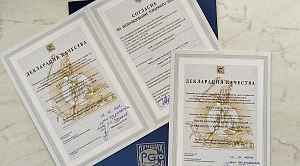
The refractories of the Magnezit Group are the best in Russia
18/12/2024
Magnezit Group is a diploma winner of the All-Russian competition of the federal program «100 best goods of Russia» in the nomination «Industrial and technical products» with two types of refractories.
The award ceremony took place in Chelyabinsk on December 12. At the federal stage of the competition, the Southern Urals was represented by 16 enterprises with 40 types of products and services.
Two products of the Magnesite Group for steelmaking were awarded diplomas of the «100 best goods of Russia» program. Carbon oxide products are widely used in the linings of the main units of ferrous metallurgy: oxygen converters, steelmaking furnaces, steel-teeming ladles. Their production is carried out at the Progress innovative production complex, constructed within the framework of the large-scale production modernization programme>.
The other winner is also used in steelmaking — it is a type of non-shaped products, engineered specifically for lining of thundishes.
Both types of products, as well as other refractories manufactured by the Magnesite Group, provide consumers with a wide range of advantages, successfully coping with the most difficult service conditions.
14/11/2024: Magnezit Group participated in the Southern Ural civil forum 2024
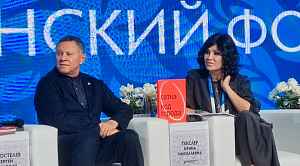
Magnezit Group participated in the Southern Ural civil forum 2024
14/11/2024
The events of the VII Southern Ural civil forum, a key discussion platform on socio-economic development, civic society and social responsibility of business, took place in Chelyabinsk. This year, under the chairmanship of Alexey Texler, Governor of the Chelyabinsk Region, the Forum once again brought together active and caring people — representatives of NGOs, business leaders, heads of federal and regional authorities.
«Corporate social responsibility of business» became a key topic of the Forum and the subject of its strategic session, which was held with the participation of Magnezit Group, remaining a vivid example of an active and responsible approach to the development of the region. The session was moderated by Irina Texler, a founder of the 2020 Foundation, and Sergey Korostelev, President of the Magnezit Group, spoke about his vision of Satka future and those social initiatives of the Magnezit Group that have had and continue to have a positive impact on the development of human capital and the socio-cultural environment in general.
As an example, he cited a number of unique projects implemented by the Group. Among them is the program «Chess universal education. Chess for General Development», which covers over 500 schools and kindergartens in the Chelyabinsk region, including all educational institutions in the Satkinsky district.
Since 2014, the Open Heart Foundation for homeless animals has been operating with the support of the Group. Over the years of its work, more than 8,000 animals have been helped, and educational programs have been launched for 15,000 schoolchildren.
In his speech, Sergey Korostelev also noted that improving the quality of urban life and the social climate, as well as the development of territories, is directly correspondent to the achieved cultural level. Among the most significant projects, the President of the Magnezit Group named the E.V.Obraztsova International Classical Music Festival, attended by more than 80,000 people — residents and guests of the Satkinsky district, as well as exhibitions of paintings fr om the collection of the State Russian Museum. And his announcement about a general agreement to open a branch of the Russian Museum in Satka and begin work in this direction was greeted with applause by the Forum guests.
«All Magnezit Group’s social projects are aimed at the development of the territory. Big cities suck out the best people like a vacuum cleaner. And Satka is a small mono—industry town that depends on the Magnezit Group. And our philosophy is simple: we are trying to develop the space and implement modern and interesting projects so that people do not leave Satka. For the future of any city, it is its people who are most important, therefore strengthening human capital, supporting talents, attracting and retaining them is the most important mission of urban development, culture and education» - said Sergey Korostelev.
He also spoke about the experience of interacting with space, which has become a strategic focus of urban development for Satka. This includes the long—term international creative project «My Satka», aimed at radically transforming the urban environment, the large-scale environmental programs «Million Trees» and «Blooming City», and the largest infrastructure facility, the Satka ice arena, built with the support of the governor and the Magnezit Group in 2023.At the conclusion of the event, wh ere RMK, TMK, MMK and other major industrial companies also shared their experience, Irina Texler stressed the importance of the strategic vision of the territory’s development and the formation of its social well-being, which Magnezit Group and its president Sergey Korostelev adhere to. All the results are presented in recently published book «Satka. The area code», presented to the participants of the discussion platform.
18/08/2024: Magnezit Group presents the main results in the field of sustainable development for 2023 in its 3rd ESG report

August 18, 2024
Responding to external challenges, in 2023 the Group continued to improve corporate governance and adapt its product line, logistics and sales to meet customer requirements. At the same time, the Group remained on course to continue technical modernization and technological development.
As part of its commitments to the UN Sustainable Development Goals, the Group pursued the priorities and standards of environmental protection, set both in Environmental Policy and in the Agreement with the Government of the Chelyabinsk Region on cooperation to improve the environmental situation in Satka. At the same time, as a city-forming enterprise in the regions of its presence, the Group accelerated investments in the socio-cultural development of local communities, infrastructure development, contributing to the implementation of a number of National projects of Russia.
Main results:
For partners
In collaboration with customers, suppliers and contractors, the Group continues to develop its product line, creating import substitution opportunities in the metallurgical, cement and other key sectors of the national industry. At the same time, considerable attention is being paid to the expansion of regional ties and sustainable industrial cooperation to take it to new levels.
• The total volume of investments under the global technological modernization program in 2023 amounted to 2.6 billion rubles, exceeding 37 billion rubles. The introduction of modern technologies and innovations, automation and robotization of processes makes it possible to gradually increase the competitiveness of manufactured refractories — the degree of customer satisfaction with the quality of Magnezit Group products in 2023 amounted to almost 86%.
• A significant change in the geography of supplies has been achieved: as a result of structural adjustment, the share of Russian manufacturers of materials and equipment in the supply chain has increased by a quarter over the past three years and reached 75%.
• The development of the quality management system continued with the tightening of standards and the introduction of new regulations. In March 2023, a re-certification audit was conducted, which confirmed the Group’s compliance with the requirements of ISO 9001:2015.
• New types of refractory materials and products have been developed — by replacing imported materials in their composition with Russian components, cost reduction for customers has been achieved while improving all previously achieved physical and mechanical characteristics.
For nature
The basis of the activity for the production of refractory materials is the use of natural resources. In this regard, the Group continues to implement a set of measures to develop rational and economical technologies of their use to reduce the impact of production on the environment in the regions of its presence and on a global scale.
• Due to the development of the energy management system and the launch of new equipment in 2023, total energy consumption decreased by 22% compared to 2022, energy/revenue ratio decreased by 5.6%.
• Direct greenhouse gas emissions decreased by 26%.
• The volume of waste generation has been reduced by 23%, new technologies have been introduced for their use as components of a filling mixture for filling empty space in mines.
• The implementation of programs for the reclamation of the lands of the Satka production site and adjacent territories, as well as the Blooming City project, continued.
For employees
Magnezit Group is a large employer — the team has more than 4,500 employees. Attracting qualified personnel, promising young employees and retaining experienced professionals in the current conditions of personnel shortage in the economy as a whole determines the need for active management of human resources.
• In 2003, in order to strengthen human resources and scientific and technical expertise, the Group developed cooperation with industry educational and scientific institutions to update and launch educational programs taking into account the needs of the refractory industry. By the end of 2023, more than 50 Magnezit Group fellows were studying at various universities and colleges in the country.
• The system of material and non—material motivation of employees is constantly developing - the average wage growth for the Group over the past three years has amounted to 40%, the number of participants in the corporate programs "Healthcare" and "Transformation" has increased significantly.
• The Group continued to build balanced and productive relationships with its employees and associations that collectively represent their interests. In 2023, a new Collective Agreement was approved until the end of 2025, which retains all guarantees and compensations that were in force earlier.
• The volume of training on industrial safety and labor protection has been increased by 72% compared to 2022.
For the country and territories of presence
The Group's activities are important both for the economy of the country as a whole, since refractory products are vital for production in basic industries, and for regions of production activities. The Group is a responsible taxpayer, steadily increasing the volume of gratuitous investments within the framework of charitable projects, programs for infrastructure development in the regions of its presence, and developing partnerships with stakeholders for sustainable development.
• In 2003, the volume of financing of social programs exceeded 600 million rubles. A large infrastructure facility of the city, the Satka Ice Arena, has been put into operation. Other areas of investment include culture, the development of public spaces in the city, sports, and education.
• Mandatory payments amounted to more than 3.5 billion rubles. In particular, the Group's taxes were about 40% of all taxes paid to the budget of the Satkinsky municipal district of the Chelyabinsk region.
• Magnezit Group constantly participates in the largest scientific forums and openly shares its technological developments for the progress of the national industry. In particular, in 2023, according to tradition, the Group became the main partner and permanent participant of the International Conference of Refractories and Metallurgists, as well as a participant in the II Ecological Water Forum of the Southern Urals.
The report is available in Russian language only
17/06/2024: Heads of industrial enterprises of the Chelyabinsk region, representatives of regional authorities discussed issues of industry development at the site of the Magnezit Group

June 17,2024
A meeting of the Board of the Chelyabinsk Regional branch of The Russian Union of Industrialists and Entrepreneurs (RSPP) was held in Satka. Before the event, the leaders of the Magnezit Group demonstrated their colleagues the achievements of the Group within the framework of a large—scale modernization programme. The guests visited the «Russian Magnezit» observation deck, the «Avant-garde» fused magnesia facility and the «Impulse» fired shaped products production complex, and then gathered in the «Magnezit» palace of culture hall.
The meeting started with the address by the head of the region Alexey Texler, he noted the success of the regional economy and the growth of social activities of local business. In this regard, the president of the Magnezit Group, Sergey Korostelev, spoke about the sustainable development of production, focusing on its future prospects, ongoing programmes for the development of the region’s infrastructure and projects for local communities.
We are making great efforts to preserve and develop human potential, — said Sergey Korostelev. — Much of what you saw during the visit was created by joint work with the regional authorities, with the support of Alexey Texler. A vivid example of this is the Satka Ice Arena. The big, federal projects «Strong Family» and «Chess Universal Education» also originated in Satka, the «Million Trees» and «Blooming City» programmes are being implemented. There are many more projects waiting for us in the future. This path is not easy, but we see it clearly and know how to reach the destination. We can do it together.
The meeting was also attended by deputies of the State Duma of the Russian Federation, senators, members of the regional government, representatives of the Sverdlovsk regional RSPP and the All-Russian Non-Governmental Organization of Small and Medium Business «OPORA RUSSIA». The results of the work of the local RSSP since the beginning of this year were summed up, and the participants also discussed issues of cybersecurity of employees, changes in the rules for replenishing aquatic biological resources, the implementation of the educational project «Professionalism» and other topics. The meeting ended with the signing of agreements between Magnezit Group and South Ural State University.
— It is always a pleasure to visit Satka, Magnezit, to observe how the city gets prettier over time, how the enterprise develops. This is a great example for us, the manufacturers. There is much to learn, — said Semyon Mitelman, Vice President of the Russian Union of Industrialists and Entrepreneurs.
14/06/2024: Environmental projects of the Magnezit Group are the winners of the "Best ESG projects in Russia" award

June 14, 2024
Magnezit Group large-scale projects on reforestation and compensation of greenhouse gas emissions «Million Trees» and «Blooming City» are among the winners of the «Best ESG Projects of Russia» award. Under the Million Trees project, the Group has planted more than one million trees in Satka to preserve the natural beauty of the Satkinsky district of the Chelyabinsk Region, increase biodiversity and improve air quality in the areas adjacent to the production site. The Blooming City project, launched in 2023 at the request of citizens to consolidate success of the Million Trees program, is only gaining momentum — but already the plantings include about 2.5 million flowers and almost 2.5 thousand seedlings of shrubs and trees on urban territories.
In particular, within the framework of the project, unique gardens of natural flora appeared in Satka, where deciduous and coniferous shrubs, flowers, ornamental cereals and ferns grow. Using the most effective landscaping techniques proposed by the scientific partners of the Group, it helps to to mitigate urban monotony and bring nature and the city closer together.
The jury of the competition highly appreciated the Group’s expertise in rational and responsible production with maximum attention to its environmental impacts within the framework of the global partnership for sustainable development. In each of the Group’s projects implemented as part of a large-scale modernization program, at least 20% is invested in green production and environmental initiatives.. Reduction of emissions is one of the key results of the program, for example, the efficiency of gas purification equipment systems is 99.9%, and direct greenhouse gas emissions have been reduced by a quarter in recent years. The new environmental projects additionally support the Group’s long-term goals of sustainable reduction of the carbon footprint and minimizing the environmental impact of the region’s industry in accordance with the adopted Environmental Policy.
23/05/2024: Magnezit Group is a co-organizer of the International Conference of refractories manufacturers and metallurgists

May 23, 2024
Managers and specialists of the Magnezit Group take part in the international conference of refractory manufacturers and metallurgists, which is being held with the support of the Group at the National Research Technological University «MISIS» in Moscow on May 23-24.
At the opening ceremony of the conference, the Group representatives delivered a report on activities of the Association of manufacturers and consumers of refractories and further development of cooperation with industry associations and major consumers from the metallurgical, cement and glass industries. They also emphasized the need for continued support of import substitution programmes both on the supply side of refractory materials to Russian customers and in terms of the development of heavy-machinery production for the needs of the industry. This approach is aimed to increase the sustainability and economic security of the entire national industry.
As a technological leader in the refractory industry, Magnezit Group pursues an active policy to develop scientific and technological cooperation and openly shares achievements in the field of innovation with stakeholders as part of its sustainable development strategy. This year, Magnezit Group technical specialists are presenting their research on various topics and discussing the new technologies and materials to increase the stability and durability of specific thermal vessel linings.
Magnezit workers will take part in the forum and visit an exhibition of instruments, equipment, technological developments and thematic literature, which will be organized as part of the conference.
For more than 20 years, this conference has served as a multinational platform for discussion and resolution of current issues by representatives of the metallurgical, refractory and their partner industries of Russia, the CIS countries, Europe and China. The Magnezit Group is its initiator and traditionally acts as a co-organizer, the Group’s leaders serving as members of the organizing committee.
17/04/2024: Magnezit Group presented innovative experience in using industrial waste

April 17, 2024
This unique exhibition at the Chelyabinsk «Non-Museum of Garbage» is timed to coincide with the Day of Environmental Knowledge and the All-Russian campaign «Week of Environmental Knowledge». The Group presented its own exposition of technologies used for recycling and using waste, which significantly reduce the burden on the environment while increasing the efficiency of production activities.
The Group’s stand tells in figures and facts about the processes developed by our specialists for the environmentally friendly extraction of magnesite in a mine using a hardening composite. In its manufacture, waste rock remaining after the extraction of raw materials from the Group’s deposits, metallurgical waste supplied by partners and cement are used.
For comparison, the previously used mining method — room and pillar mining — required leaving 30% of the raw materials in the mine in the form of supports that prevent collapses, thus, a significant part of the valuable resources became inaccessible for further use. The use of a hardening composite instead makes it possible to extract 100% of natural magnesite while ensuring the stability of the earth’s surface, reduces the volume of waste rock dumps and provides opportunities for efficient use of metallurgical waste.
With respect for natural resources and preserving the possibilities of their use for future generations, the Group contributes to the implementation of the Sustainable Development Goals supported by it, including assistance in greation of sustainable consumption and production patterns (UN Goal No. 12). The Group also shares its experience in reducing the burden on the environment and developing eco-culture in the regions of its presence, talks about modern industrial complexes and production processes with the prefix «eco» to promote the sustainable development agenda and fulfill national priorities in this area.